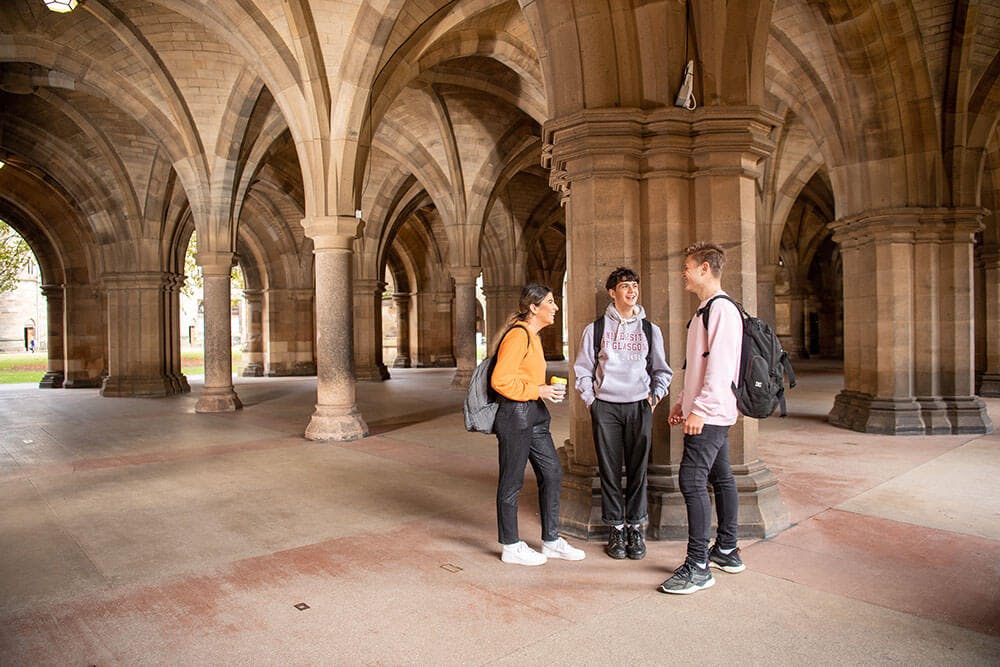
How University of Glasgow attracts and uses postgraduate Unibuddy ambassadors

The challenge: Provide authentic engaging environment for remote prospective students to ask questions prior to application
Generally, universities know that if a student attends an open day, they have on average a 30% chance of conversion. But how do you create opportunities for that kind of connection when your prospective student lives thousands of miles overseas?
“67% of our postgraduate cohort is international,” said University of Glasgow Recruitment Marketing Manager Ann Wilber. “This means they likely won’t step foot in Glasgow, attend an open day, and experience the tried and tested methods of traditional higher ed marketing when considering Glasgow.”
It’s a real challenge.
“It’s the nitty-gritty stuff that adds the value, the stuff that’s pretty much impossible to share on our website.” said Wilber. “It’s not the top 10 reasons for postgraduate students to study in Glasgow, course content, or high rankings—it’s answers to questions like: ‘Will I fit in on campus?’; ‘How many hours do you spend in lectures vs seminars and labs each week?’; ‘What are my career options?’ Postgraduates have very specific and specialised questions.”
Glasgow was looking for a tool where students could ask these questions and get quick answers they could trust. The idea was to address doubts and remove barriers to application.
Solution: Unibuddy enables authentic connections between prospective students at-scale
University of Glasgow adopted Unibuddy to help facilitate authentic connections between prospective students and their enrollment team – including student ambassadors – regardless of where they were located.
“We’ve rolled out Unibuddy to almost all of our subject areas and have hundreds of students on the platform. Prospective students love it,” said Wilber. “We’re now just shy of hitting one hundred thousand messages. How would those conversations happen without the channel?”
Glasgow also liked the non-intrusive way Unibuddy empowered prospective students to connect with their team on their own terms. They feel this added an extra layer of credibility to their messaging.
“It’s about amplifying the human voice of our university and, to that end, the whole programme is voluntary. We get the best students that way,” said Wilber. “It’s not uncommon to see conversations like ‘Hey, I’m not paid to say this so you know I’m being true!’ which gives our programme an extra layer of authenticity. International postgrads especially need this—so they can find out all the information not covered on the website as it’s harder for them to visit campus, particularly at the moment.”
Wilber is clearly passionate about the project. When asked about how she keeps so many students motivated to answer questions, she shares:
“I don’t have to run ads to get new students on board. Our Academic Schools are bought in, so much so that they offer extra credit for students becoming a Unibuddy student ambassador—it’s been amazing for getting students who give it their all,” said Wilber. “I work hard to make sure all our ambassadors get extra value from volunteering and stay motivated. With PGT’s these students are only here for a year and they have a busy schedule with dissertations taking up a huge chunk of their time towards the end of their studies.”
To this end, Wilber and the Glasgow team have created incentives for students to join their student ambassador program like ensuring their contributions appear on the Higher Education Achievement Records (HEAR). Student ambassadors also receive an official certificate of completion which they can append to their LinkedIn profile.
Results: Additional Unibuddy tools enabled Glasgow to further amplify their reach and messaging to reach more prospective students
The University of Glasgow went above and beyond with the Unibuddy, leveraging the platform’s features like user generated content publication tools.
“I was already a fan of Unibuddy, but during the pandemic it really came into its own,” said Wilber. “Our students produced blog content around mental health, how to handle anxieties and get through lockdown. It was some of our highest performing content in student comms and for me it became clear how important it was to encourage student blogs. The key was to ensure our ambassadors were writing about what was interesting and of value to their peers at that specific time.”
This plays out on social media too. Industry-wide, user generated content for social channels tends to perform six hundred times better than content produced by the brand itself. When asked what her biggest surprise from using Unibuddy is, Wilber shared:
“Honestly, it has to be how lovely and helpful students can be. Think about it: They are usually young, keen and haven’t got immediate career commitments—they have a lot of time and love to give! They give great advice and enjoy helping their peers and I can see in the conversations taking place that they reassure students in the decision they are going to make and take away a lot of doubt or confusion. They genuinely want to help the person they are talking to by sharing their experience at the University of Glasgow.”
Use Cases
The university needed a tool that would allow students to ask questions and get quick answers that they could trust—something that could address anxieties and remove barriers to application.
Results
Their students produced blog content around mental health, how to handle anxieties, and get through lockdown. It was some of their highest performing content in student comms.